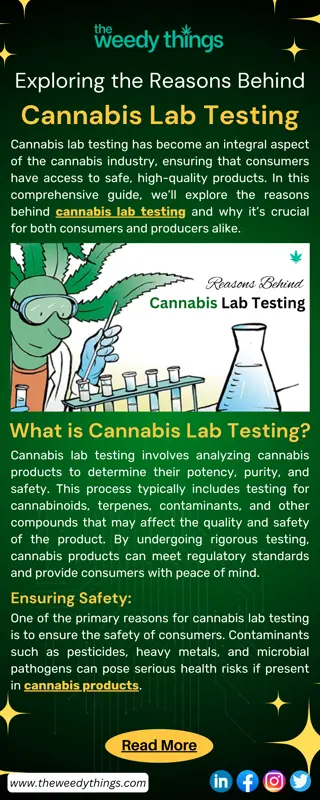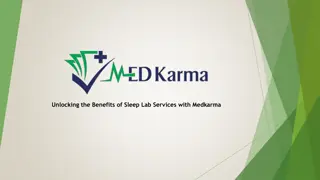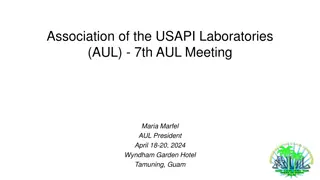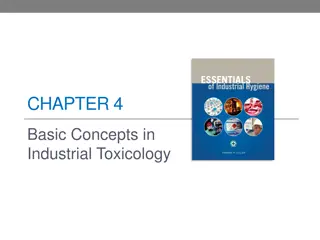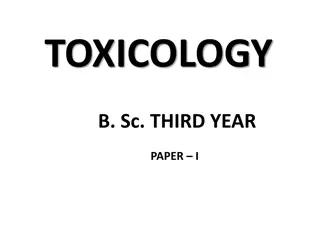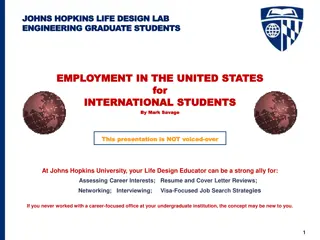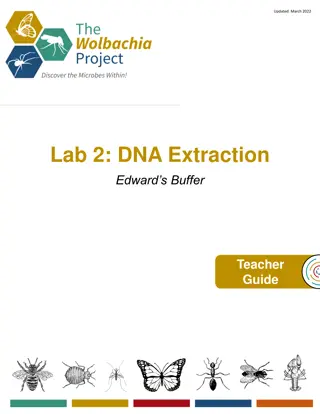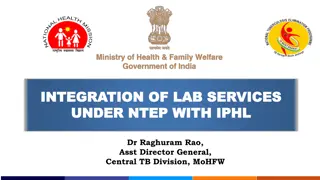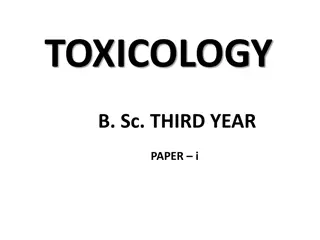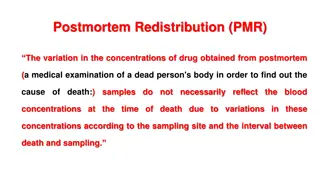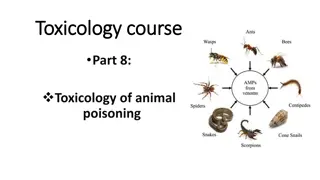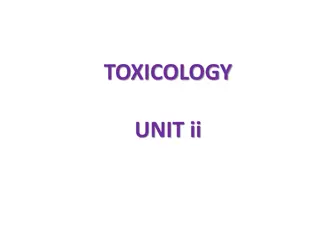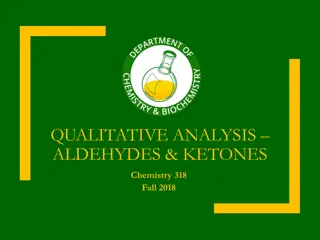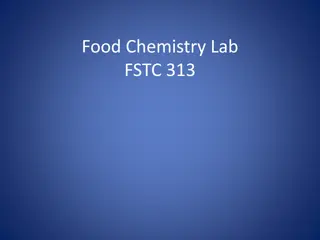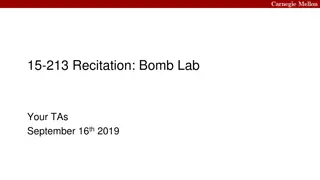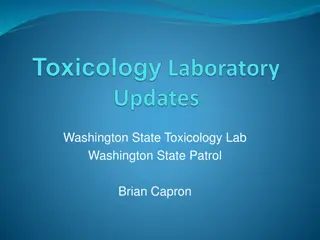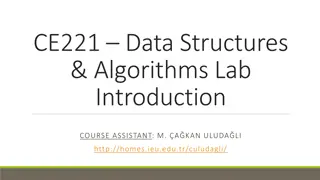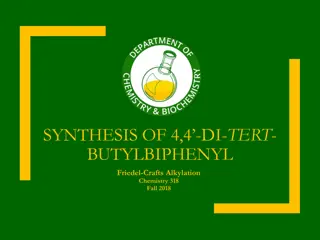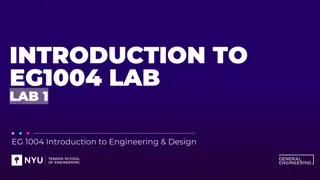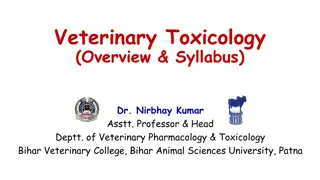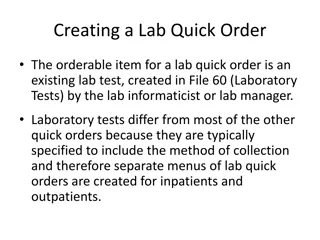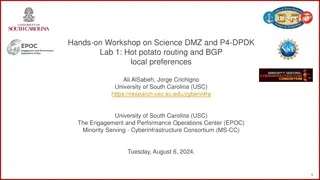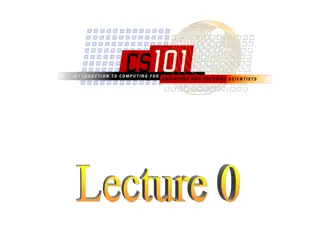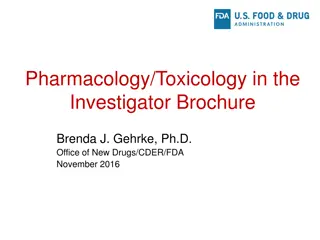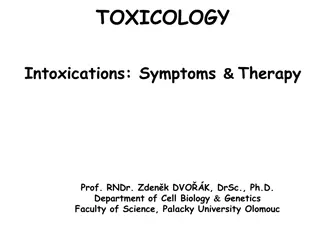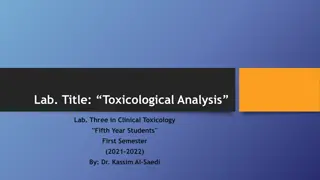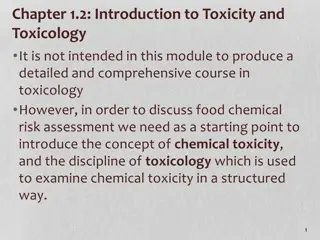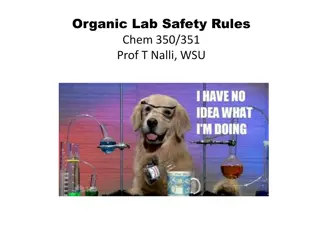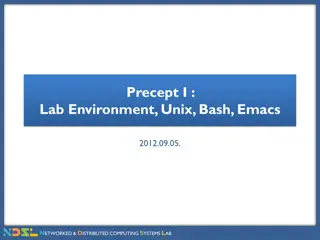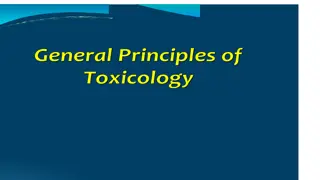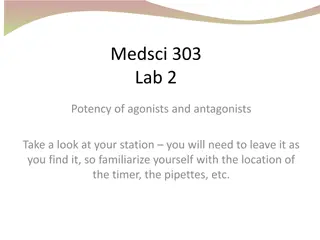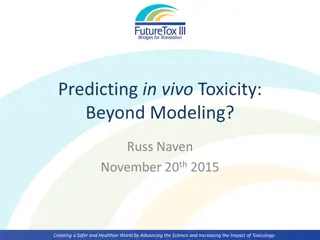Identification of Cardioactive Glycosides in Pharmacognosy Lab Experiments
In this Pharmacognosy lab session, students learn about the identification of cardioactive glycosides through chemical tests like Baljets Test and Keller-Killians Test. These tests involve specific procedures using reagents like picric acid, sodium hydroxide, glacial acetic acid, ferric chloride, an
0 views • 11 slides
Comprehensive Overview of ABE Lab Manual and Foundations of Biotech Package
The ABE Lab Manual, authored by Doreen Osgood, MS, PhD, is a comprehensive resource for biotechnology education, including sequences like Genetic Engineering and Colony PCR. The manual includes teacher and student guides, along with related resources like PowerPoint presentations and lists of labora
1 views • 5 slides
Exploring the Reasons Behind Cannabis Lab Testing
Cannabis lab testing has become an integral aspect of the cannabis industry, ensuring that consumers have access to safe, high-quality products. In this comprehensive guide, weu2019ll explore the reasons behind cannabis lab testing and why itu2019s crucial for both consumers and producers alike.\n\n
12 views • 1 slides
Physics 2BL Laboratory: Measurements, Error Analysis & Data Interpretation
This Physics 2BL laboratory course focuses on measurements of physical quantities, error analysis, and interpretation of data. Students learn how scientists create models of natural phenomena and the practical aspects of conducting scientific experiments. Pre-requisites include Physics 2A, 4A or equ
0 views • 31 slides
Unlocking the Benefits of Sleep Lab Services with Medkarma
In today's fast-paced world, quality sleep is more important than ever. Sleep disorders, which can significantly impact overall health and well-being, are on the rise. This is where sleep lab services come into play. Medkarma, a leading name in the healthcare industry, offers top-notch sleep lab ser
1 views • 7 slides
Association of the USAPI Laboratories (AUL) Overview
The Association of the USAPI Laboratories (AUL) was established to strengthen lab networks in the USAPI countries, promote excellence in laboratory services, serve as a resource for USAPI laboratories, and impact health planning through lab-based surveillance. Key initiatives include adopting lab st
1 views • 14 slides
Understanding Basic Concepts in Industrial Toxicology
Industrial toxicology is a vital field that studies the effects of various agents on organism health through mechanisms of action, toxicokinetics, and more. It explores toxic chemical absorption, distribution, metabolism, and elimination, as well as toxic effects on major organ systems. Learn about
0 views • 35 slides
Understanding Toxicology: Dose-Response and Toxicity Assessment
The study of toxicology involves understanding dose-response relationships, lethal concentrations, tolerance limits, toxicity curves, and factors influencing toxicity. Dose, response, acute toxicity, chronic toxicity, LD50, and ED50 are key concepts in toxicology that help assess the effects of chem
2 views • 24 slides
Johns Hopkins Life Design Lab - Engineering Graduate Students Employment in the United States
Welcome to the Johns Hopkins Life Design Lab, where engineering graduate students can access resources for assessing career interests, resume reviews, networking, interviewing, and visa-focused job search strategies. The lab aims to bridge the gap between employer expectations and student skills, pr
0 views • 17 slides
Lab 2: DNA Extraction Techniques for Arthropods and Wolbachia
In this lab activity, students will learn how to isolate genomic DNA from arthropods and Wolbachia bacteria. The goal is to transition from fieldwork to molecular biology, utilizing DNA as a diagnostic tool. The activity involves extracting total genomic DNA from identified species and includes pre-
0 views • 11 slides
Integration of Lab Services and TB Elimination Mission 2025
This document discusses the integration of lab services under NTEP with IPHL, led by Dr. Raghuram Rao from the Central TB Division, MoHFW. It also outlines the National TB Elimination Mission 2025 goals, diagnostic algorithms, existing lab networks, facility levels, diagnostics expansion, and extern
0 views • 17 slides
Introduction to Toxicology: Science and Impact on Living Organisms
Toxicology is the study of adverse effects of chemicals on living organisms. It assesses probability of occurrence, quantitatively and qualitatively analyzing toxic effects. Toxicants are agents causing harmful responses in biological systems. Environmental toxicology focuses on pollutants' effects
0 views • 12 slides
Understanding Postmortem Redistribution in Forensic Toxicology
Postmortem Redistribution (PMR) refers to the variation in drug concentrations obtained from postmortem samples, which may not accurately reflect the levels at the time of death due to redistribution mechanisms. In forensic toxicology, assessing drug severity relies on blood concentrations, with cha
0 views • 16 slides
Understanding Animal Venom and Snake Classification in Toxicology
Animal venom, particularly snake venom, contains various toxins that can have detrimental effects on the body. Different types of snake venom target specific systems, such as neurotoxic venom affecting neuromuscular junctions and hemotoxic venom impacting the cardiovascular system. Understanding the
4 views • 27 slides
Overview of Toxicology: Understanding Chemical Risks and Health Impacts
Toxicology is a crucial field that assesses the effects of various toxic substances on human health and the environment. From heavy metals to solvents, radiation, pesticides, and animal toxins, this discipline plays a vital role in identifying and managing risks associated with exposure to harmful c
0 views • 25 slides
Qualitative Analysis of Aldehydes and Ketones in Chemistry Lab
In this Chemistry 318 lab, students will conduct qualitative analysis of aldehydes and ketones using chemical and spectroscopic methods. The lab includes classification tests, spectroscopy (IR, 1H-NMR/13C-NMR, MS), and identification of unknown compounds. Experimental procedures involve physical eva
1 views • 11 slides
Food Chemistry Lab FSTC 313 Rules and Regulations
In the Food Chemistry Lab FSTC 313, students are expected to adhere to strict guidelines regarding attendance, lab safety, late policies, missed lab policies, and technical abstract requirements. The lab emphasizes group work, application notes for the food industry, and individual abstract writing
5 views • 24 slides
Opportunities for Undergraduates in Health Research Lab
The Mohan Research Lab offers undergraduates the chance to conduct impactful research that can be published, focusing on biomarkers and targets for autoimmune diseases and cancers. Led by an international team of researchers, the lab provides a collaborative environment for students to engage in cut
4 views • 12 slides
15-213 Recitation: Bomb Lab Overview and Tips
This content covers the Bomb Lab exercise in x86-64 assembly code and GDB debugging techniques. It explains the purpose of Bomb Lab, downloading the bomb, detonating the bomb, hints for solving phases, and x86-64 Linux register usage. The material emphasizes the importance of using GDB for efficient
1 views • 42 slides
Toxicology Laboratory Updates and Certifications
The Washington State Toxicology Lab, under the Washington State Patrol, has recent staffing updates, including new hires and return of staff on maternity leave. Updates on validated methods and toxicologist certifications are provided, showcasing the lab's commitment to quality and accuracy. A new t
0 views • 26 slides
Precision Assembly Lab Guidelines
This guide provides step-by-step instructions on how to perform a precision assembly lab effectively. From understanding lab assignments to seeking assistance and proper documentation, this resource covers key aspects to ensure a successful lab experience. Following these instructions will help you
2 views • 11 slides
Clemson ECE Laboratories - Electronics Lab Information
Explore pre-labs for ECE 311 Electronics Lab I, created by Steven Chambers in Fall 2012 at Clemson University. The labs cover topics like curve tracer plots for diodes and transistors, background on Bipolar Junction Transistors (BJTs), instructor and lab coordinator contact information, mandatory sa
0 views • 69 slides
Introduction to CE221 Data Structures & Algorithms Lab with Assistant M. A. Kan Uludağlı
CE221 Data Structures & Algorithms Lab offers opportunities to work on solving selected book questions, quizzes, multiple lab exercises, and coding assignments under the guidance of Assistant M. A. Kan Uludağlı. The assignments will be completed in the lab environment, focusing on Java coding assi
0 views • 7 slides
Organic Chemistry Synthesis Lab Overview for Fall 2018
The post provides detailed information on the synthesis of 4,4-di-tert-butylbiphenyl through Friedel-Crafts Alkylation in Chemistry 318 for the Fall 2018 semester. It includes a schedule of the lab day, due dates for reports and assignments, grading criteria, pre-lab requirements, and emphasis on si
1 views • 15 slides
Introduction to EG1004 Lab - Engineering & Design Overview
Introductions, lab format, absence and tardy policies, student expectations, course resources, makeup lab policies, and website registration details for EG1004 Introduction to Engineering & Design lab. Learn about lab group formats, quiz procedures, policies on late arrivals and absences, student re
1 views • 10 slides
Overview of Veterinary Toxicology Syllabus and Topics Covered
Detailed overview of the Veterinary Toxicology syllabus including general toxicology, toxicity caused by metals and non-metals, poisonous plants, agrochemical toxicity, fungal and bacterial toxins, venomous bites and stings, and more. The syllabus covers a wide range of topics related to toxicology
0 views • 12 slides
Managing Lab Quick Orders for Efficient Testing Workflow
Lab quick orders for existing lab tests in an EHR system are crucial for efficient testing workflows. Different menus are created for inpatients and outpatients, specifying collection methods and instructions. This comprehensive guide covers the process of creating lab quick orders, including exampl
0 views • 10 slides
Hands-On Workshop on Science DMZ and P4-DPDK Lab
Join the workshop at the University of South Carolina to learn about hot potato routing, BGP local preferences, and hands-on lab activities focusing on network topologies and configurations. Explore the Lab Topology, Lab Configuration, and Platform Information for an interactive learning experience
0 views • 6 slides
CS101 Course Overview and Lab Information
CS101 is a foundational course covering Engineering CAD/Prototyping tools, MATLAB, Unix/Linux, software design, and C programming. The course involves attending lectures, group software projects, quizzes, programming assignments, midterm exams, and regular study of lecture notes. Lab activities are
0 views • 23 slides
Understanding Pharmacology and Toxicology in Investigator Brochures
Explore the essential aspects of pharmacology and toxicology covered in Investigator Brochures, including nonclinical information, safety pharmacology, general toxicology, genetic toxicology, and more. Learn about the significance of pharmacology in predicting intended and unintended effects, consid
1 views • 40 slides
Overview of Toxicology: Intoxications, Symptoms, and Therapy
Understanding toxicology is crucial to dealing with various types of intoxications, including accidental, foodborne, inhalation, industrial, and intentional exposures. Symptoms of toxic exposure can vary widely, affecting different body systems such as the cardiovascular, respiratory, and nervous sy
0 views • 9 slides
Analytical Toxicology: Techniques and Sample Analysis in Clinical Toxicology
Analytical toxicology involves the observation, identification, and measurement of foreign compounds in biological and other samples, such as urine, blood, stomach contents, nails, hair, and DNA. Various techniques are used to isolate and identify drugs and poisons present in these samples. This fie
0 views • 12 slides
Introduction to Toxicity and Toxicology in Food Chemical Risk Assessment
This module introduces the concept of chemical toxicity and the discipline of toxicology in relation to food chemical risk assessment. It touches upon historical aspects, such as the case of Socrates' death by hemlock, the contributions of Mathieu Joseph Bonaventure Orfila in forensic toxicology, an
0 views • 18 slides
Organic Lab Safety Rules - Chem 350/351
Chemical safety is paramount in the organic lab. Always wear splash-proof goggles, report injuries promptly, and know the locations of safety equipment. Submit pre-lab plans, work in fume hoods, wear gloves as instructed, and follow lab schedules. Unauthorized experiments and food/drink are prohibit
0 views • 35 slides
Networking and Distributed Computing Systems Lab Setup Guide
Set up your lab environment for networking and distributed computing systems using Unix, Bash, and Emacs. Learn to access lab machines via SSH, use PuTTY and Terminal for communication, simulate Linux environment on Windows with Cygwin, run different OS on VMware Player, download and install Linux o
0 views • 14 slides
Understanding Toxicology and Measures of Toxicity
Toxicology is the study of the adverse effects of chemicals on living organisms, involving xenobiotics and poisonous substances. Toxicologists examine the nature of these effects, testing in lab animals for measures of toxicity such as mortality, teratogenicity, carcinogenicity, and mutagenicity. Ke
0 views • 18 slides
Pharmacology Lab Equipment and Safety Guidelines
Explore the setup and procedures of a Pharmacology lab focusing on agonists and antagonists potency testing. Learn about equipment, tissue suspension, lab safety, lab plan, and health precautions. Follow instructions for conducting experiments, recording data, and cleaning up. Utilize resources prov
0 views • 28 slides
Advancing In Vivo Toxicity Prediction Beyond Modeling
Explore the challenges and opportunities in predicting in vivo toxicity beyond traditional models. Learn about confidence in toxicity prediction, recently discontinued drugs due to safety concerns, and the importance of recognizing toxicological signals in preclinical stages. Discover how computatio
0 views • 27 slides
Understanding Food and Nutritional Toxicology
Food and nutritional toxicology delve into the science of poisons, toxins, and toxicants found in food. It covers substances harmful to consumers, including natural toxicants, contaminants, and additives. Nutritional toxicology focuses on the overlap between nutrition and toxicology, exploring the i
0 views • 17 slides
Lab Safety
Lab Safety. Professor Lei Zhu\u2019s Research Group 2013.10.09. Outlines. Lab Safety Training Eye Protection Lab Coat Gloves Fume Hoods CHP, ECP Emergency. 1. Lab Safety Training. You can work in the lab only after you finish the lab
6 views • 10 slides


